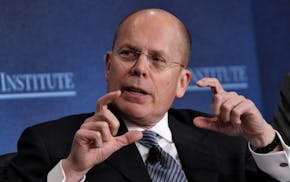The trade groups for Minnesota's nursing homes are suing the state, challenging the legitimacy of a new workforce standards board and its proposed rules regarding holiday pay.
A complaint filed Tuesday in federal court argues Minnesota officials are punishing nursing homes by imposing costly workforce standards on them while simultaneously preventing them from raising rates to cover the costs.
"Nursing homes are already stressed financially," according to a statement from the Long-Term Care Imperative, which represents two of Minnesota's nursing home trade groups. "Providers can't simply raise rates to increase wages for caregivers unless the Minnesota Legislature acts."
The lawsuit in U.S. District Court directly challenges a Nov. 7 decision by the Minnesota Nursing Home Workforce Standards Board to require 150% pay for nursing home workers on 11 state holidays, arguing that the rule interferes with contract negotiations between nursing homes and workers. The case also stands as a broader challenge to the board itself, which was created in 2023 by the Legislature and given sweeping powers to create standards to entice more workers to nursing homes and help solve the state's staffing crisis.
A spokesperson for the Minnesota Department of Labor and Industry said Tuesday the state "has been notified of the lawsuit and is in the process of reviewing the complaint."
There's broad agreement that the nursing home staffing crisis is real, especially in rural Minnesota. A report earlier this month by the Center for Rural Policy and Development showed Minnesota has lost 33% of its nursing home beds since 2005. The decline was already underway because of the rise of senior care alternatives such as at-home services and assisted-living facilities, but it worsened after a COVID-19 pandemic that burned out nursing home workers, the report found.
The decline is expected to create severe problems for Minnesota over the next two decades, when the massive baby boomer generation moves beyond its 70s and into its 80s and needs higher-level nursing care. The rural policy report projected Minnesota will need staffing to cover more than 37,000 nursing home beds for seniors by 2045, an increase from 27,000 beds right now.
Many Minnesotans already can't find open beds close to their homes and loved ones, and instead move hours away for nursing care or short-term rehabilitation after hospital stays, said Erin Huppert, a vice president for LeadingAge Minnesota, a nursing home trade group. "That really means something to those families and those residents and those patients as they recover."
Less contentious solutions included a Next Generation initiative to provide free training so people could quickly become nursing assistants and fill nursing home vacancies.
The standards board was a more partisan issue, advanced by DFL lawmakers with support from unions such as SEIU Healthcare, which represents thousands of nursing home workers in Minnesota and Iowa.
Three representatives of the nursing home industry have been routinely outvoted on the nine member board, which includes three representatives for workers and three officials from Gov. Tim Walz's administration. That included votes this year that set minimum wage standards for nursing home workers, including an hourly rate of $22.50 for certified nursing assistants in 2026 that will increase to $24 in 2027.
Better pay could stem the loss of workers who want to stay in nursing homes and care for residents, said Rasha Ahmad Sharif, an SEIU executive vice president, in a statement. "We hear every day from our members who work in nursing homes that they love this work, that this work is who they are, and they can't see themselves doing anything else. But the work has become intolerable."
The nursing homes are resisting state standards while also opposing an upcoming federal rule change designed to improve the care and safety of residents by requiring them to employ higher-paid registered nurses and maintain strict nurse-to-resident staffing ratios. Some nursing home leaders said they are hopeful the rule will be rescinded by President Donald Trump's administration before it ever takes effect.

UnitedHealth sues the Guardian, alleging defamation in coverage of nursing home care

Prices for international flights drop as major airlines navigate choppy economic climate
Minnesota's med spa industry rises in popularity — and with little regulation

Hundreds line up at Best Buy to nab Nintendo Switch 2, in scene like '90s opening parties

